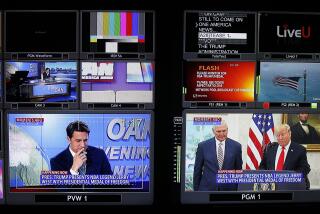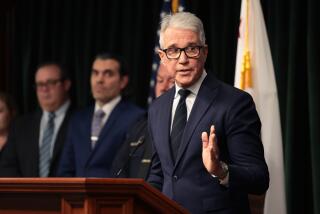SEC Agrees to Settle Fraud Suit Against O.C. Bus Shelter Firm : Regulations: Pyramid scheme was alleged by the commission. Metro Display Advertising denies the charge but agrees never to violate laws in the future.
- Share via
TUSTIN — A week after filing a lawsuit alleging a complex pyramid scheme, the Securities and Exchange Commission agreed Monday to settle its case against a Tustin bus shelter company and its former president, Jean Claude LeRoyer.
In separate consent agreements with the SEC, Metro Display Advertising and LeRoyer, while neither admitting nor denying any wrongdoing, agreed never to violate federal securities laws in the future.
An SEC official alleged last week that LeRoyer took $850,000 from the company, much of which was used for his Newport Beach home. The SEC said that its investigation is continuing and that LeRoyer could still be liable for repayment of any money he is found to have wrongfully taken from the company.
For now, the SEC does not plan to seek any repayment from the company. “We got everything we wanted the court to give us,” said Sylvia Scott, an SEC assistant regional administrator in Los Angeles. “We feel like we have done our job and done a service” to investors.
In his first interview since Metro Display filed for federal bankruptcy protection Jan. 22, LeRoyer denied the SEC allegations that the company operated a Ponzi scheme or was engaged in any type of fraudulent activity.
“It is a legitimate business. Our advertising revenue is getting greater and greater,” said the 47-year-old native Frenchman.
The settlement will likely come as welcome news to investors who are trying to reorganize Metro Display, which does business as Bustop Shelters of California. The investors’ group wants to reorganize the company into a business in which it would hold a 90% stake. Many investors have criticized the SEC, saying the court action was inhibiting their ability to salvage their investments.
Investors--4,500 by the SEC’s count and 1,055 by Metro Display’s--each plunked down $9,500 to $10,000 to buy a shelter in a lease-back arrangement. The company raised $48 million from investors ostensibly to build shelters and pay cities for places to put them. In return, Metro Display promised to make $170 monthly lease payments to investors and then buy back the shelters after five years, essentially doubling their original investment.
But the lease payments stopped abruptly last month just before Metro Display filed for Chapter 11 bankruptcy. The SEC suit, filed last week, alleged that Metro Display was making lease payments to longtime shelter owners using money from new owners. That, according to the SEC, constituted a classic Ponzi, or pyramid, scheme.
LeRoyer, who founded the company in 1984, denies that the firm operated a pyramid scheme. Metro Display, he said, spent $200,000 on legal advice before starting the investment program several years ago.
Ad revenue has totaled $350,000 to $500,000 a month, he said. By year’s end, Metro Display would have increased its ad revenue to $800,000 to $1 million a month, safely covering the investor lease payments, which totaled about $600,000 a month, according to LeRoyer.
LeRoyer, who continues to work in a non-management role for the company, blamed the SEC investigation for the slip in revenue. “I have been fighting the SEC so much I haven’t had time to deal with advertising sales,” he said.
He conceded, however, that “my weakness is in financing” and that he “was flying without a compass” when it came to financial matters.
LeRoyer said he and his wife, Karen, who worked for the company in various capacities, were paid salaries plus $350,000 in loans that they intended to pay back.
More to Read
Sign up for Essential California
The most important California stories and recommendations in your inbox every morning.
You may occasionally receive promotional content from the Los Angeles Times.













